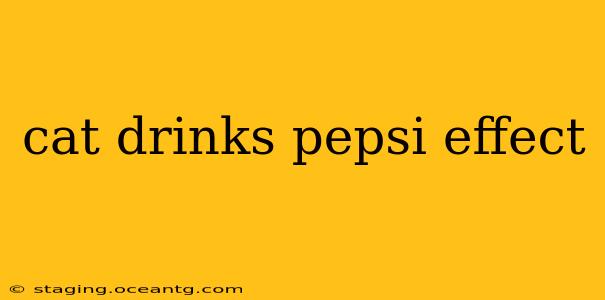The internet is awash with videos of cats seemingly enjoying a sip of Pepsi or other carbonated drinks. While these clips can be amusing, the question remains: what effect does Pepsi, or any carbonated beverage, have on cats? The short answer is: it's not good for them. Let's delve deeper into the potential consequences of a cat drinking Pepsi.
Is Pepsi Toxic to Cats?
While a small amount of Pepsi might not immediately cause catastrophic harm, it's far from beneficial. The ingredients in Pepsi – the high sugar content, caffeine, artificial sweeteners, and carbonation – all pose potential risks to a cat's health. It's crucial to understand that cats are obligate carnivores and their digestive systems aren't equipped to process many of the components found in soft drinks.
The Dangers of High Sugar Content
The high fructose corn syrup and sugar in Pepsi can lead to several problems for cats:
- Weight gain and obesity: Excess sugar contributes to weight gain, increasing the risk of diabetes, heart disease, and other health complications.
- Dental problems: The sugar promotes the growth of harmful bacteria in the mouth, leading to tooth decay and periodontal disease.
- Diabetes: Cats are prone to diabetes, and a high-sugar diet significantly increases their risk.
Caffeine's Impact on Cats
Caffeine is a stimulant that can have detrimental effects on cats, even in small doses. It can lead to:
- Hyperactivity and restlessness: Cats might become overly energetic and agitated.
- Increased heart rate and blood pressure: This can strain the cardiovascular system.
- Gastrointestinal upset: Vomiting and diarrhea are common symptoms.
- Seizures: In more severe cases, caffeine can trigger seizures.
Artificial Sweeteners: A Hidden Threat
Many diet sodas, including some Pepsi variants, contain artificial sweeteners like aspartame or sucralose. The long-term effects of these sweeteners on cats are not fully understood, but they are generally considered unsafe and should be avoided.
What Happens if My Cat Drinks Pepsi?
If your cat drinks a small amount of Pepsi, it might not show any immediate symptoms. However, larger quantities can lead to the problems mentioned above. Keep a close watch on your cat for any signs of distress, such as vomiting, diarrhea, hyperactivity, or lethargy. If you notice any concerning symptoms, contact your veterinarian immediately.
Should I induce vomiting?
Whether or not you should induce vomiting depends on several factors, including the amount of Pepsi ingested and your cat's overall health. It's best to consult your vet immediately for guidance. They can advise you on the best course of action based on your cat's specific situation.
How to Prevent My Cat from Drinking Pepsi
The best approach is prevention. Keep all sugary drinks, including Pepsi, out of your cat's reach. Securely store them in cabinets or out of your cat's jumping range.
Frequently Asked Questions (FAQ)
What are the signs of Pepsi poisoning in cats?
Signs can range from mild gastrointestinal upset (vomiting, diarrhea) to more serious symptoms like hyperactivity, increased heart rate, and seizures.
Is one sip of Pepsi harmful to a cat? While unlikely to cause immediate harm, it's best to prevent even small amounts to avoid any potential long-term issues.
What should I do if my cat drinks Pepsi? Monitor your cat closely for any unusual symptoms. If you notice any concerns, contact your veterinarian immediately.
Can Pepsi kill a cat? While unlikely from a single small sip, large amounts or repeated consumption could lead to serious health problems, potentially even death in severe cases due to organ failure or other complications stemming from the sugar, caffeine, and artificial ingredients.
This information is for general knowledge and does not substitute professional veterinary advice. Always consult your veterinarian if you have concerns about your cat's health.
